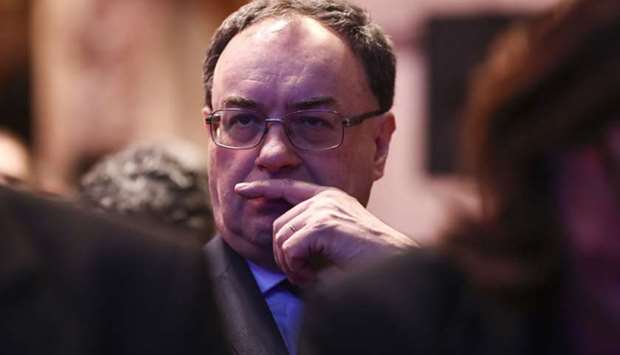Bank of England governor Andrew Bailey made clear that policymakers could expand monetary stimulus as soon as next month as the UK faces potentially the worst economic slump in Europe.
His pledge to “act as necessary” suggests bond buying could be expanded for as long as needed, creating a programme without limits.
Bailey said he makes no distinction between having a target for quantitative easing and an open-ended commitment, as the Federal Reserve and European Central Bank have effectively done.
The BoE “could do more QE” in June, Bailey said in an interview with Bloomberg Television.“We’re keeping all options open.”
Bailey spoke after the BoE’s latest decision, which saw two of its nine policy makers vote to immediately increase QE by £100bn ($124bn). The rest agreed that downside risks “might necessitate further monetary policy action.”
They noted that the current target of £645bn will be hit by July, suggesting an increase at June’s meeting.
“We’ve still got quite a bit of road left on that programme and we’ll keep going down that road,” Bailey said in a press conference.
With its main rate at 0.1%, and the BoE reluctant to go below zero, QE has become the main policy tool to help the economy.
Under a scenario published yesterday, the central bank said the economy could shrink 14% this year because of coronavirus restrictions.
That would be the biggest contraction since 1706.
Bailey, who pledged “total and unwavering commitment” to safeguard the economy during the crisis, told reporters that the fact no action was taken this time doesn’t rule out a response soon.
“It’s only a matter of time before the central bank loosens again. We expect more QE to be announced in June.”
Like the Fed and the ECB, the BoE has slashed interest rates and increased quantitative easing since March to keep the economy afloat as activity ground to a halt.
Most of the hit to the economy will come this quarter, with GDP expected by the BoE to be 30% lower compared with the end of last year.
Unemployment more than doubles to 9%. While it expects a strong rebound in 2021, the slump for this year is far sharper than the 8.3% predicted by the European Commission on Wednesday and more than projected by the Office for Budget Responsibility, the UK fiscal watchdog.
It’s also deeper than the downturns predicted for Italy and Spain, though the assumptions for the projections may not line up exactly.
That BoE view is based on social distancing measures and government support remaining as they are until early June, before gradually being unwound by the end of the third quarter. The government’s programmes “are working,” Bailey said in the Bloomberg TV interview, but “there’s an uncertain exit path from the furlough scheme.”
Other European countries started to lift parts of the lockdown this week.
In the UK, the government is considering easing some of the more stringent measures, though the economy will likely continue to need support.
Jonathan Haskel and Michael Saunders were the officials who wanted to lift asset purchases.
Most MPC members said there was value in waiting for more information on how the lockdown will be relaxed.
The benchmark interest rate was left at a record-low 0.1% in a unanimous decision.
Asked if rates could be cut below zero, Bailey said “I don’t want to say we’re nearer to negative rates, but we’re not ruling anything out.” Still, the central bank is “nowhere near” using that tool, he added.
The BoE assumes the UK economy recovers all its lost growth by late 2021.
That’s relatively optimistic compared with the eurozone, where the ECB central scenario doesn’t see a return to pre-virus strength until well into 2022.
The pound rose on that projected rebound and the decision not to increase bond-buying right away.
It was up 0.1% to $1.2365 at 12:04pm UK time.
Yesterday, BoE policy makers also warned that if banks don’t help companies through the cashflow strains of the virus lockdowns, there’ll be huge damage to the economy, and to banks themselves.
Restricting lending could lead to a cascade of insolvencies, higher unemployment and falling house prices, all of which would ripple back to the financial industry.
“Continued expansion of bank credit is essential if deeper and longer lasting damage to the economy is to be mitigated,” the BoE said. “It is in the collective interest of banks.”

Bank of England governor Andrew Bailey says he makes no distinction between having a target for quantitative easing and an open-ended commitment, as the Federal Reserve and European Central Bank have effectively done.
